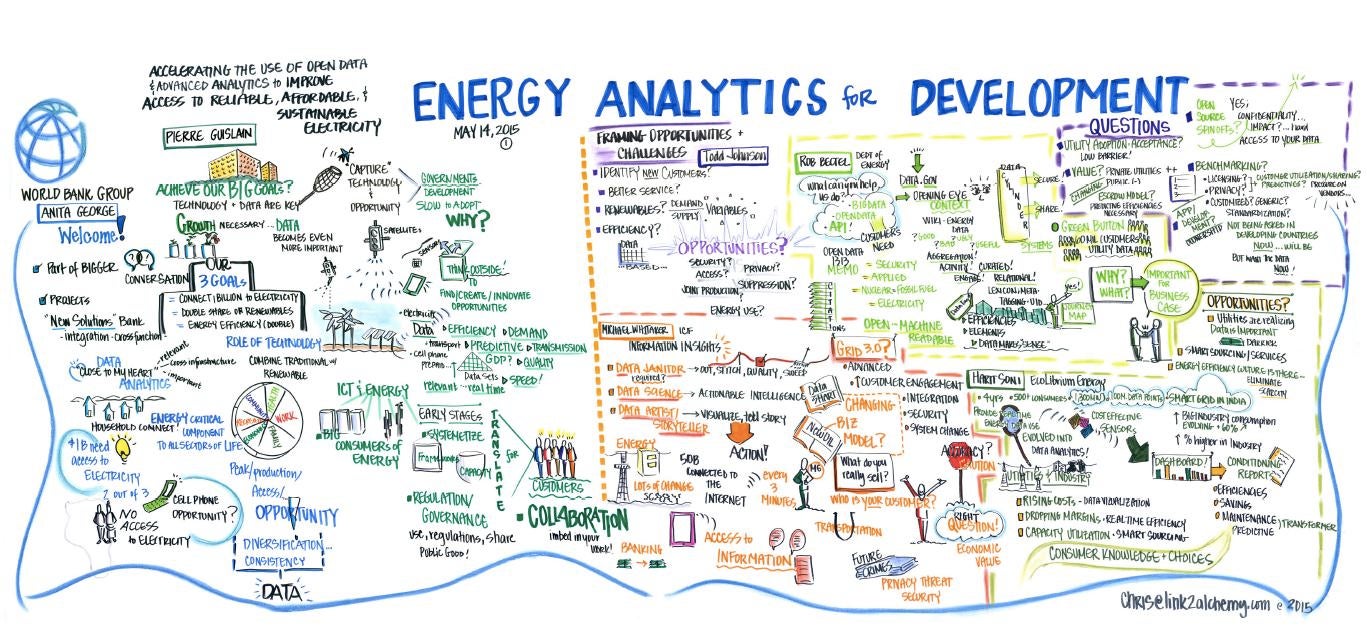
simple designs and strategic illustrations
Today, about 1.1 billion people around the world live without electricity. Cities, which now house more than half the world’s population, struggle under the weight of inefficient, expensive and often-polluting energy systems. Energy access and affordability are paramount in addressing poverty alleviation and shared prosperity goals, and cleaner energy is critical in mitigating climate change.
Applications of Open and Big Data principles and advanced analytics is an area of innovation that can help address many pressing energy sector challenges in the developing world, as well as provide social and financial dividends at low cost.
The World Bank Group is committed to accelerating the use of Open Data and advanced analytics to improve access to reliable, affordable and sustainable electricity, in line with its commitment to the Sustainable Energy for All (SE4ALL) initiative. In order to increase awareness around opportunities of new data capturing and analyzing solutions in the energy sector in emerging markets, the World Bank Group and University of Chicago hosted a training session and a subsequent workshop in mid-May.
The workshop was opened two World Bank leaders: Anita Marangoly George, Senior Director of Energy and Extractives Global Practice and Pierre Guislain, Senior Director of Transport and ICT Global Practice. Both speakers cited the importance of embracing the data revolution, adopting technology responsibly and using advanced analytics to help transform the energy sector and to achieve the Sustainable Development Goals (SDGs).
The World Bank Group is developing Big Data solution briefs for a number of subsectors as part of its “Program for Innovations in Big Data and Analytics for Development.” Financed by the Energy Sector Management Assistance Program, World Bank teams are currently finalizing the energy solution brief, called Energy Analytics for Development. Participants and experts at the workshop agreed that the use of energy analytics in development can be a game changer, and will be absolutely necessary to achieve the SE4ALL targets by 2030.
Some of the key opportunities enabling this paradigm shift will be discussed in the forthcoming primer, and include:
- Energy access: Using advanced analytics to expand energy access by offering more flexible means of payment, including payment schedules like off-grid solar home systems, using pay-as-you-go or pre-paid systems enabled by extensive mobile phone penetration in Eastern Africa, as well as empowering price-sensitive customers to shift their load to times where power is cheaper (off-peak).
- Energy efficiency: Energy efficiency investments have been constrained by difficulty in measuring efficiency potential and efficiency gains. Advanced analytics has facilitated a move to a new outcome-based paradigm that could help unlock its full potential. Energy analytics help to identify efficiency opportunity, predict likely savings, estimate realized savings, and test technical and behavioral interventions for relative cost effectiveness at scale.
- Renewable energy: Integrating increased renewable energy in the grid is already technically and financially feasible. Over the long term, primary challenges will become operational challenges where data science will be instrumental. Utilities will need to be able to predict solar and wind exposure on different parts of the grid in real-time, anticipate consumer responses to price signals, and enable a responsive grid – with similar challenges for distributed storage models.
- Asking the right questions! Data is already available and technical challenges are being overcome: how to use data will continue to be the key to success.
- Technological and capacity constraints include cost of upgrading infrastructure, integration of new analytics with existing IT infrastructure, and lack of local capacity to manage data analytics programs.
- Political and governance limitations, including lack of awareness of potential of Big Data in energy regulation, data privacy, data accessibility, and improved sector governance. Sorting through masses of available data and for governments in particular to select what data to make available.
Presentations from the workshop:
Robert Bectel, Senior Program Analyst, U.S. Department Of Energy
Matt Gee, Senior Researcher, Urban Center for Computation and Data and the Center for Data Science and Public Policy, University of Chicago; Co-founder and Principal at the Impact Lab
Harit Soni, EcoLibrium Energy
Michael Whitaker, Vice President, Information Insights, ICF International
Chris Chopyak drawings:
Energy Analytics for Development
Energy Analytics - Insights
Real Issues


Join the Conversation